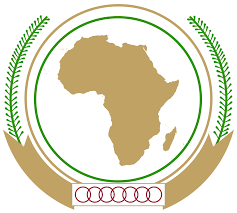African Union

The African Union (AU) is a continental body consisting of the 55 member states that make up the countries of the African Continent. It was officially launched in 2002 as a successor to the Organisation of African Unity (OAU, 1963-1999) in order to create a new continental organisation to build on its work. The decision to re-launch Africa’s pan-African organisation was the outcome of a consensus by African leaders that in order to realise Africa’s potential, there was a need to refocus attention from the fight for decolonisation and ridding the continent of apartheid, which had been the focus of the OAU, towards increased cooperation and integration of African states to drive Africa’s growth and economic development.
The work of the AU is implemented through several principal decision making organs:- The Assembly of Heads of State and Government, the Executive Council, the Permanent Representatives Committee (PRC), Specialised Technical Committees (STCs), the Peace and Security Council and The African Union Commission. The AU structure promotes participation of African citizens and civil society through the Pan-African Parliament and the Economic, Social & Cultural Council (ECOSOCC).